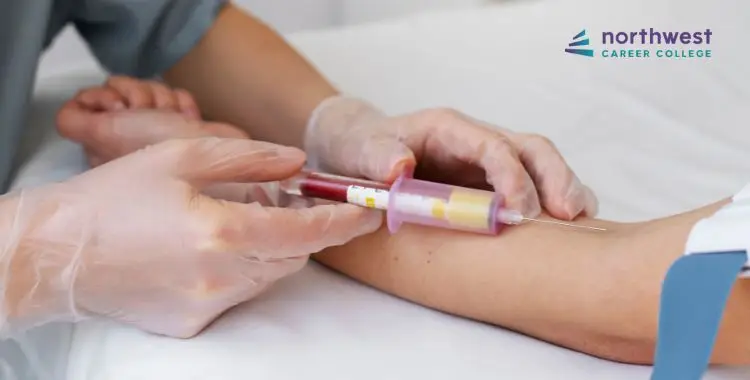Phlebotomy: Is It The Right Career For You?
- Phlebotomy Technician
- October 25, 2024
- 4.7k views
- 6 min read

If you’re thinking about a phlebotomy certification, you probably have many questions. Is it the right career for you? What kind of training do you need? What are the job prospects like?
In this blog post, we’ll take a look at all of these questions and more. Phlebotomy can be a great career choice for the right person, but it’s important to ensure it’s the right fit for you.
So let’s dive in and learn more about what a career in phlebotomy involves.
Table of Contents
Job description: What phlebotomists do on a day-to-day basis
Phlebotomists are an essential part of any healthcare team, providing vital services such as drawing blood from patients for laboratory testing and collecting tissue samples. They typically maintain a fast-paced schedule, as they may draw hundreds of samples daily from both inpatients and outpatients.
Phlebotomy technicians must employ knowledge of the techniques required to properly draw blood or collect tissue samples, handle these materials carefully and protect themselves from contact with biological material.
Phlebotomists also must have knowledge of hospital best practices and keep accurate records of patient specimens. Since they must interact with patients to discuss the procedure, answer questions, and manage complex interactions while maintaining a calm exterior demeanor.
Phlebotomists must also closely follow safety procedures and use protective equipment to prevent the spread of disease within a hospital setting. As such, these medical professionals have an important duty in helping to ensure smooth patient care in an efficient healthcare setting.
In short, Phlebotomy is more than just taking blood; it entails providing high-quality patient care while also safeguarding healthcare professionals from risks posed by biological materials. A successful Phlebotomy technician requires not only technical skills but also interpersonal skills, as well as adherence to industry standards and regulations.
Education and training requirements
In order to practice phlebotomy, one must receive proper education and training that covers topics such as anatomy and physiology, safety theory, phlebotomy procedures, sample collection techniques, laboratory testing protocols, Federal healthcare and privacy laws, medical terminology, and other important topics related to phlebotomy.
It is also required that phlebotomists complete an accredited phlebotomy program before they can be certified. Those who professionally perform phlebotomy in a clinical setting must also have proof of necessary qualifications and completion of certain practical skills assessments depending on their exact job scope.
For individuals interested in pursuing a career as a phlebotomist, it is recommended that they achieve certification through one of several national organizations like the American Society for Clinical Pathology or the National Phlebotomy Association.
Achieving certification may require additional courses and examinations that cover a comprehensive range of topics related to phlebotomy, which will help equip them with the necessary knowledge to succeed in this essential field.
Salary and job outlook
The job outlook for phlebotomists is quite favorable, with some estimates predicting a 27 percent growth in jobs from 2016 to 2026. This growth rate is much faster than average for all occupations, meaning phlebotomists should have no trouble finding opportunities once they enter the workforce.
Furthermore, phlebotomists tend to receive salaries that are commensurate with their education and training requirements, making them a desirable choice for those who are seeking a career path that is both rewarding and lucrative.
According to the U.S. Bureau of Labor Statistics, phlebotomists earned an average annual salary of over $34,000 in 2021. Given the expected growth in phlebotomy-related jobs and the potential for decent wages among phlebotomists, this field may be ideal for those seeking stability and security in the job market.
Those wishing to pursue a career as a phlebotomist can expect a rewarding professional experience with good prospects for future success.
Pros and cons of the job
Working as a phlebotomist can be an extremely rewarding job.
On the plus side, phlebotomists are often connected to medical facilities, where they build essential relationships with staff and patients throughout the hospital or clinic. The work schedule is also quite flexible, allowing phlebotomists a good work-life balance.
Additionally, phlebotomy offers a chance to make a real difference in people’s lives; phlebotomists collect samples that help to inform diagnoses and ensure that patients get the care they need.
Of course, phlebotomy isn’t without its downsides. The job requires precision and technical skill coupled with human empathy—often under challenging time pressure—which can be physically and emotionally rigorous.
Moreover, phlebotomists may be exposed to various contaminants, such as blood or other fluids, when doing their job, necessitating strict safety protocols.
Ultimately, while there are potential downside risks associated with working as a phlebotomist, the chance to impact patients’ lives makes it an attractive role for many aspiring medical professionals.
Is Phlebotomy right for you?
Phlebotomy is a job field well worth considering, especially for those who enjoy interacting with people on a daily basis. If you have a passion for the medical field, can handle stressful situations easily, and don’t mind working in challenging conditions, then phlebotomy is definitely something to look into.
It offers a rewarding career with stable job security and long-term prospects. With appropriate training and certification, you can be sure that you will have an excellent career path in phlebotomy, and you will be able to help those in need along the way.

A worthwhile and rewarding healthcare career
Although the job of a phlebotomist may seem straightforward, there is actually a lot that goes into the day-to-day duties.
Phlebotomists must have excellent people skills, as they constantly interact with patients who may be nervous or upset. They must also be detail oriented and able to follow instructions correctly in order to ensure that the correct sample is collected.
If you think you have what it takes to become a phlebotomist, Northwest Career College can help you get started on your new career path. Our Phlebotomy Program will provide you with the skills and training necessary to succeed in this field. Contact us today to learn more!
Start your new career today
At Northwest Career College, we pride ourselves on providing one of the premier Phlebotomy Schools in Las Vegas.
Our established and seasoned instructors will take you through every aspect of Phlebotomy and Northwest offers day, afternoon, and night classes to accommodate your busy Las Vegas work and family schedule.
Call us today at (702) 403-1592 to speak to one of our admissions specialists about your new Phlebotomy career.




